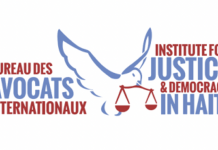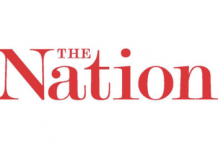New Internal Report Slams UN Cholera Cover-Up
by Kim Ives (Haiti Liberte)
UN officials
are frantically fending off questions about their organization being to blame
for importing cholera into Haiti following the leak last week of an internal
Special Rapporteur draft report which slams their “existing approach of simply
abdicating responsibility [as] morally unconscionable, legally indefensible,
and politically self-defeating.”
are frantically fending off questions about their organization being to blame
for importing cholera into Haiti following the leak last week of an internal
Special Rapporteur draft report which slams their “existing approach of simply
abdicating responsibility [as] morally unconscionable, legally indefensible,
and politically self-defeating.”
On Aug. 18, the day after freelance
reporter Jonathan Katz (the AP’s former Haiti correspondent) leaked excerpts of
New York University law professor Philip Alston’s draft report in the New York Times, a New York State Appeals
court upheld a lower court decision granting the UN
“immunity” from a class-action suit being brought on behalf of Haitian cholera
victims. (Alston’s full report was published in the New York Times Magazine on Aug. 20).
reporter Jonathan Katz (the AP’s former Haiti correspondent) leaked excerpts of
New York University law professor Philip Alston’s draft report in the New York Times, a New York State Appeals
court upheld a lower court decision granting the UN
“immunity” from a class-action suit being brought on behalf of Haitian cholera
victims. (Alston’s full report was published in the New York Times Magazine on Aug. 20).
UN Secretary General Ban Ki-moon’s
deputy spokesman Farhan Haq stated that the UN “needs to do much more regarding
own involvement in the initial outbreak,” stopping short of admitting
responsibility or specifying what exactly “much more” is.
deputy spokesman Farhan Haq stated that the UN “needs to do much more regarding
own involvement in the initial outbreak,” stopping short of admitting
responsibility or specifying what exactly “much more” is.
On Aug. 19, Mr. Ban issued a
statement saying he “deeply regrets the terrible suffering” the cholera
epidemic has caused Haitians and assumed “a moral responsibility to the
victims” by “building sound water, sanitation and health systems.”
statement saying he “deeply regrets the terrible suffering” the cholera
epidemic has caused Haitians and assumed “a moral responsibility to the
victims” by “building sound water, sanitation and health systems.”
But Haitian victims represented by the
Institute for Justice and Democracy (IJDH) are suing the UN to take legal responsibility for unleashing the
world’s worst cholera epidemic and to pay restitution to its victims, which is
precisely why the UN is still hedging.
Institute for Justice and Democracy (IJDH) are suing the UN to take legal responsibility for unleashing the
world’s worst cholera epidemic and to pay restitution to its victims, which is
precisely why the UN is still hedging.
“Any restitution will ultimately
have to come from member states,” notes Katz in the New York Times Magazine. “None is more invested than the United
States, which supplies more than a quarter of the United Nations peacekeeping
budget, an expenditure that Washington, perennial congressional grumbling
notwithstanding, has generally considered well spent: It allows the United
States to outsource many overseas military missions it would otherwise feel
pressure to undertake itself. The Bush administration led the way in creating
the UN Stabilization Mission in Haiti, or MINUSTAH, putting together a
blue-helmeted force to replace U.S. soldiers and Marines whom Bush sent to
Haiti after a 2004 coup d’état.” (This explains why in New York State court
hearings, only U.S. government attorneys defend the UN’s “immunity.” The UN has
never deigned to appear.)
have to come from member states,” notes Katz in the New York Times Magazine. “None is more invested than the United
States, which supplies more than a quarter of the United Nations peacekeeping
budget, an expenditure that Washington, perennial congressional grumbling
notwithstanding, has generally considered well spent: It allows the United
States to outsource many overseas military missions it would otherwise feel
pressure to undertake itself. The Bush administration led the way in creating
the UN Stabilization Mission in Haiti, or MINUSTAH, putting together a
blue-helmeted force to replace U.S. soldiers and Marines whom Bush sent to
Haiti after a 2004 coup d’état.” (This explains why in New York State court
hearings, only U.S. government attorneys defend the UN’s “immunity.” The UN has
never deigned to appear.)
Mr. Alston is also explicit. “Fears
have been expressed that the success of the current litigation could ‘bankrupt’
the United Nations itself, or at least its
peacekeeping operations,” he wrote in his report.
have been expressed that the success of the current litigation could ‘bankrupt’
the United Nations itself, or at least its
peacekeeping operations,” he wrote in his report.
The
IJDH is asking $100,000 for deceased cholera victims and $50,000 for each
victim who suffered illness and injury, which, multiplied by the current
official figures of 9,145 dead and 779,212 infected, would amount to almost $40
billion. “Since this is almost five times the total annual budget for
peacekeeping worldwide, it is a figure that is understandably seen as
prohibitive and unrealistic,” Alston writes. “At a time of widespread budgetary
austerity, shrinking support for multilateral development and humanitarian
funding, and the prioritization of funding for the refugee crisis, it is
perhaps not surprising that both the United Nations and Member States [i.e. the
U.S.] have in effect put the Haiti cholera case into the ‘too hard basket’ and
opted to do nothing. But again this is short-sighted and self-defeating.”
IJDH is asking $100,000 for deceased cholera victims and $50,000 for each
victim who suffered illness and injury, which, multiplied by the current
official figures of 9,145 dead and 779,212 infected, would amount to almost $40
billion. “Since this is almost five times the total annual budget for
peacekeeping worldwide, it is a figure that is understandably seen as
prohibitive and unrealistic,” Alston writes. “At a time of widespread budgetary
austerity, shrinking support for multilateral development and humanitarian
funding, and the prioritization of funding for the refugee crisis, it is
perhaps not surprising that both the United Nations and Member States [i.e. the
U.S.] have in effect put the Haiti cholera case into the ‘too hard basket’ and
opted to do nothing. But again this is short-sighted and self-defeating.”
The
UN’s Special Rapporteur warns of “the consequences that could follow if
national courts become convinced that the abdication policy is not just
unconscionable but also legally unjustified” and urged the UN “to offer an
appropriate remedy.”
UN’s Special Rapporteur warns of “the consequences that could follow if
national courts become convinced that the abdication policy is not just
unconscionable but also legally unjustified” and urged the UN “to offer an
appropriate remedy.”
The
IJDH originally tried to seek redress for Haitian
victims within the UN grievance system in November 2011. Almost a year and a
half later, their petition was rebuffed with a mere two page letter. That is when the IJDH resorted
to the U.S. court system to get restitution and force UN investment in
rebuilding Haiti’s water and sanitation systems.
IJDH originally tried to seek redress for Haitian
victims within the UN grievance system in November 2011. Almost a year and a
half later, their petition was rebuffed with a mere two page letter. That is when the IJDH resorted
to the U.S. court system to get restitution and force UN investment in
rebuilding Haiti’s water and sanitation systems.
“We
have 90 days to decide whether to appeal to the Supreme Court,” following last
week’s Appeals Court ruling, Brian Concannon told Haïti Liberté. “We will make that decision based on our legal
analysis, but also based on whether the UN demonstrates an intent to respond to
the cholera epidemic in a way that respects the cholera victims’ rights.
Regardless of whether we appeal to the Supreme Court, we will continue to
pursue the victims’ legal claims in whatever courts are possible until the UN
respects their rights.” That may include pursuing the case in the justice system
of Haiti or a European nation, he said.
have 90 days to decide whether to appeal to the Supreme Court,” following last
week’s Appeals Court ruling, Brian Concannon told Haïti Liberté. “We will make that decision based on our legal
analysis, but also based on whether the UN demonstrates an intent to respond to
the cholera epidemic in a way that respects the cholera victims’ rights.
Regardless of whether we appeal to the Supreme Court, we will continue to
pursue the victims’ legal claims in whatever courts are possible until the UN
respects their rights.” That may include pursuing the case in the justice system
of Haiti or a European nation, he said.
Mr.
Alston notes that the UN is also doing a miserable job of financially
responding to Haiti’s cholera crisis. “While the United Nations has been keen
to emphasize how much it has done in Haiti, the reality is that member states
have so far agreed to contribute only 18% of the $2.2 billion required to
implement” a cholera eradication program scheduled to run through 2022, he
wrote.
Alston notes that the UN is also doing a miserable job of financially
responding to Haiti’s cholera crisis. “While the United Nations has been keen
to emphasize how much it has done in Haiti, the reality is that member states
have so far agreed to contribute only 18% of the $2.2 billion required to
implement” a cholera eradication program scheduled to run through 2022, he
wrote.
In
his Aug. 19 statement, Ban Ki-moon had to acknowledge that the UN’s cholera response
efforts “have been seriously underfunded, and severe and persistent funding
shortfalls remain.”
his Aug. 19 statement, Ban Ki-moon had to acknowledge that the UN’s cholera response
efforts “have been seriously underfunded, and severe and persistent funding
shortfalls remain.”
The
Special Rapporteur’s report is extremely frank and hard-hitting, leaving little
room for Mr. Ban to continue his diversionary policy of expressing “deep
regret” and calling for international “solidarity” to help Haiti solve the
public health disaster that the UN has caused.
Special Rapporteur’s report is extremely frank and hard-hitting, leaving little
room for Mr. Ban to continue his diversionary policy of expressing “deep
regret” and calling for international “solidarity” to help Haiti solve the
public health disaster that the UN has caused.
Mr.
Alston notes that “the question of who bears responsibility for bringing
cholera to Haiti has been systematically side-stepped in United Nations
analyses,” using three techniques: 1) “ to take refuge in the passive voice
whereby readers are told that ‘cholera emerged,’ or… just happened, and no
scientific or technical explanation is needed.”
2) “to invoke the need to move beyond the past and instead focus on the
future.” and 3) “to replace the term ‘responsibility’ by ‘blame’ and to then
portray the ‘blame game’ as unhelpful, distracting, unanswerable, or divisive,
and thus to be avoided.”
Alston notes that “the question of who bears responsibility for bringing
cholera to Haiti has been systematically side-stepped in United Nations
analyses,” using three techniques: 1) “ to take refuge in the passive voice
whereby readers are told that ‘cholera emerged,’ or… just happened, and no
scientific or technical explanation is needed.”
2) “to invoke the need to move beyond the past and instead focus on the
future.” and 3) “to replace the term ‘responsibility’ by ‘blame’ and to then
portray the ‘blame game’ as unhelpful, distracting, unanswerable, or divisive,
and thus to be avoided.”
As
a result, UN “auditors found that poor sanitation practices remained
unaddressed not only in its Haitian mission but also in at least six others in
Africa and the Middle East” in 2014 and 2015, risking another health crisis
like that in Haiti, the New York Times revealed
in an Aug. 19 story.
a result, UN “auditors found that poor sanitation practices remained
unaddressed not only in its Haitian mission but also in at least six others in
Africa and the Middle East” in 2014 and 2015, risking another health crisis
like that in Haiti, the New York Times revealed
in an Aug. 19 story.
The
report also said the UN “upholds a double standard according to which the UN
insists that Member States respect human rights, while rejecting any such
responsibility for itself,” an approach which “undermines both the UN’s overall
credibility and the integrity of the Office of the Secretary-General.”
report also said the UN “upholds a double standard according to which the UN
insists that Member States respect human rights, while rejecting any such
responsibility for itself,” an approach which “undermines both the UN’s overall
credibility and the integrity of the Office of the Secretary-General.”
Again
and again, the Special Rapporteur tells Mr. Ban that he has to confess his
sins, because the “scientific evidence points overwhelmingly to the conclusion
that the arrival of Nepalese peacekeepers and the outbreak of cholera are
directly linked to one another,” that “MINUSTAH was indeed the source” of the
epidemic, and that the “fact is that cholera would not have broken out but for
the actions of the United Nations.”
and again, the Special Rapporteur tells Mr. Ban that he has to confess his
sins, because the “scientific evidence points overwhelmingly to the conclusion
that the arrival of Nepalese peacekeepers and the outbreak of cholera are
directly linked to one another,” that “MINUSTAH was indeed the source” of the
epidemic, and that the “fact is that cholera would not have broken out but for
the actions of the United Nations.”
“The
bottom line is that continued United Nations reliance on the argument that the
scientific evidence is ambiguous or unclear as a way of avoiding responsibility
is no longer tenable,” Mr. Alston tells Mr. Ban, whose term ends on Dec. 31, in
the draft report.
bottom line is that continued United Nations reliance on the argument that the
scientific evidence is ambiguous or unclear as a way of avoiding responsibility
is no longer tenable,” Mr. Alston tells Mr. Ban, whose term ends on Dec. 31, in
the draft report.
The
Special Rapporteur also tells UN officials to stop “stonewalling” because in
his opinion and that “of most scholars, the legal arguments supporting the
claim of non-receivability are wholly unconvincing in legal terms,” while the
UN “has been definitively found guilty both in the scientific world and in the
court of public opinion.” He also notes that “[t]he global media has been systematically
critical of the United Nations,” citing many examples, including the Washington Post which opined: “by
refusing to acknowledge responsibility, the United Nations jeopardizes its
standing and moral authority.”
Special Rapporteur also tells UN officials to stop “stonewalling” because in
his opinion and that “of most scholars, the legal arguments supporting the
claim of non-receivability are wholly unconvincing in legal terms,” while the
UN “has been definitively found guilty both in the scientific world and in the
court of public opinion.” He also notes that “[t]he global media has been systematically
critical of the United Nations,” citing many examples, including the Washington Post which opined: “by
refusing to acknowledge responsibility, the United Nations jeopardizes its
standing and moral authority.”
In
conclusion, Mr. Alston recommends that “first and foremost, there should be an
apology and an acceptance of responsibility in the name of the
Secretary-General” that “should be done as soon as possible in order to provide
the foundation upon which subsequent steps can be based.” Those would include
“constructing a policy package to address the need for compensation to the
victims” and providing “the foundation for a new approach to be adopted by the
United Nations in the future in such cases.”
conclusion, Mr. Alston recommends that “first and foremost, there should be an
apology and an acceptance of responsibility in the name of the
Secretary-General” that “should be done as soon as possible in order to provide
the foundation upon which subsequent steps can be based.” Those would include
“constructing a policy package to address the need for compensation to the
victims” and providing “the foundation for a new approach to be adopted by the
United Nations in the future in such cases.”





